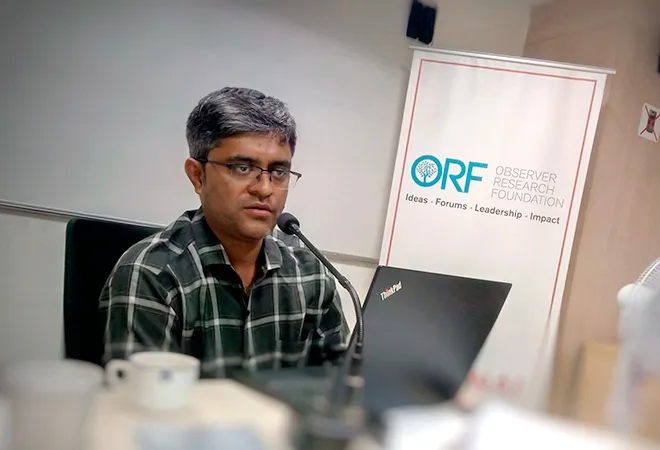-
CENTRES
Progammes & Centres
Location
The political tensions between Saudi Arabia and Iran can be better understood through the lens of ‘regimes.’

“Sectarian, ethnic and religious differences are important in West Asia. However, the regime-structure is the key to understanding the panoply of relations in the region,” said Dr. Srinivasan, Deputy National Editor, The Hindu, Chennai.
Initiating a discussion on “Saudi Arabia and the Geo-politics of West Asia,” at ORF-Chennai on 30 March 2019, Dr. Srinivasan said that there was a need to study Saudi Arabia, both from the domestic/regional angle and also in the larger international, geopolitical context. Dr. Srinivasan asserted: “By understanding the regime type in Saudi Arabia, we can understand their foreign policy motivations more clearly.”
The political tensions between Saudi Arabia and Iran, for instance, can be better understood through the lens of regime type, according to Dr. Srinivasan. “Saudi Arabia tries to project itself as the polar opposite of Iran,” he posited. However, he believed “this is not so much because Iran was a theocratic Shia regime against the Sunni rulers of Saudi Arabia. It instead owed to the fact that Iran has (also) afforded substantial space and autonomy to actors other than the clergy.”
Many argue that Saudi Arabia’s main goal is halting Iranian influence in West Asia. However Dr Srinivasan contended: “This is more than a Sunni-Shia conflict, it is to stop what they see as a virus of ‘republicanism’ (as a form of representative government) emanating in Iran.” The war in Yemen, as well as the ‘Arab Spring’, understood through this lens of regime-type, provides better insights into Saudi Arabia’s goals, according to Dr. Srinivasan. Attempts at balancing Islam, modernism and secularism in Turkey are similarly seen as a threat by Saudi Arabia, he said.
Saudi Arabia was not as antagonist towards Iran when Shah Reza Pahlavi reigned in Iran, Dr. Srinivasan said. “This shows that religion is not as strong a determinant in the tensions between Iran and Saudi Arabia,” he said. Instead, he emphasised the importance of regime difference in creating tensions. “Saudi Arabia being a monarchy, it sees republicanism as a threat. Monarchs expect to be in power forever,” remarked Dr. Srinivasan.
When it comes to the West, both countries again see things differently. “Iran sees the West as an enemy because it is strongly theocratic while Saudi Arabia will not give up close ties to the West,” the speaker explained. It was also insightful to see that, while there was some censure of Saudi Arabia over the ‘Khashoggi incident’ in the US, they remained uncannily silent as the crisis in Yemen continued to deepen, he pointed out.
While the US under President Barack Obama wanted to lessen its dependence on Saudi oil and in this regard explored shale gas as an alternative, under the incumbent administration of President Donald Trump, ties with Saudi Arabia were steadfast and extremely close, observed Dr. Srinivasan. India and other nations need to take notce of this shifts in American policy, and need to decide if it should be steadfast in its own West Asia policies, tuned to post-Cold War regional and global changes, but not more.
As Saudi Arabia was looking to diversify its economy, Dr. Srinivasan argued this must be seen as a huge opportunity both for India and Saudi Arabia. Unemployment and inequality levels were rising in Saudi Arabia. Dr. Srinivasan anticipated that “ostentatious behaviour of the monarchy would not be tolerated much longer.”
In light of these challenges, Saudi Arabia was trying to move away from oil and looking for new investment and economic opportunities in technology and infrastructure. Here, India offers a huge market with its growing middle class. As Iran drops its positions as an oil supplier for India, as US sanctions tighten, Saudi Arabia will be an important partner for India’s energy needs, the speaker opined.
In conclusion, Dr. Srinivasan said, strategic space has opened up in Saudi Arabia and it was imperative that this opportunity is not wasted. “Equally, it was important not to get sucked into the Saudi-Iran game. India has never taken a strong position on these conflicts,” he said.
India must see Saudi Arabia as a vital partner, particularly in energy and defence, and simultaneously see Iran as a gateway to Central Asia, what with Indian investment and participation in the Chabahar port project in Iran. While India has certainly moved closer towards the US, Dr. Srinivasan maintained the crucial importance of an independent nuclear deal with Iran and in this regard, he believed that India voting against Iran on the IAEA resolution of 2009 was a mistake. The effort should be for New Delhi to strike the right balance in its relations with the two nations, he said.
This report was prepared by Dr. Vinitha Revi, Research Associate, Observer Research Foundation, Chennai.
The views expressed above belong to the author(s). ORF research and analyses now available on Telegram! Click here to access our curated content — blogs, longforms and interviews.